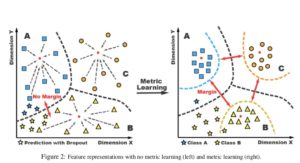DAC Student Spotlight: Fanglan Chen

Fanglan Chen, UrbComp and DAC Ph.D. student in the Department of Computer Science

Graphic is from Chen’s research on “Mitigating Uncertainty in Document Classification”
Motivated to improve the health and quality of urban environments through new data sources and methods, Fanglan Chen is simultaneously pursuing a Ph.D. in computer science and a master’s degree in urban planning.
Additionally, she plans to earn a graduate certificate in Data Analytics, offered through the Discovery Analytics Center. She already holds a graduate certificate from the multidisciplinary National Science Foundation-funded UrbComp program, which is also administered through DAC.
Chen’s research explores how new data sources and methods can be usefully applied to persistent urban issues. Her advisor is Chang-Tien Lu.
“To conduct a rationale data-drive urban study it is important to have both domain knowledge and data analytics skills,” Chen said. “Domain knowledge is fundamental in guiding why we decide to approach the urban challenge in a particular way and how a project of this scope would impact the citizens it is designed to help. Data analytics underpins modern urban planning decisions. Knowing which questions to ask and how they might be approximated by the data at hand are of equal importance in urban studies.”
Chen’s interests lie in spatial data mining, urban computing, and graph neural networks. She wants to design a novel Graph Convolutional Neural Network (GCN) model with data-driven graph filters to deal with urban computing problems.
“Graphs offer powerful representation of real-world datasets in various domains, such as networks, social links, molecular structures, and unstructured data as images and text,” Chen said. “In exploring graph neural networks, besides the model performance, my interest is in why and how it works because the urban computing problems I work on require the interpretability of the method for better decision making.”
One real-world example, she said, is forecasting hourly demand at station-level in large bikeshare networks via learning hidden pairwise correlations between stations.
Chen earned a bachelor’s degree in architecture from Wuhan University of Technology, China.
High-quality programs that allowed her to tailor curriculum to her research interests and to collaborate with faculty attracted her to Virginia Tech and DAC. She joined the northern Virginia campus because she believed it would give her exposure “to a great variety of learning and networking opportunities with nearby companies and agencies. Besides, I personally enjoy urban life,” she said.
The UrbComp program, she said, also offered a number of advantages. “It is wonderful platform to discuss current data analytics approaches in different fields and bridge the gap between the academic and industrial worlds,” said Chen, who is open to a career in either one after her graduation, projected for 2022.
Chen has collaborated on two papers included in conference proceedings: “REGAL: A Regionalization framework for school boundaries,” ACMSPATIAL 19; and “Mitigating Uncertainty in Document Classification,” (Annual Conference of the North American Chapter of the Association for Computational Linguistics (NAACL2019).
She was also one of the presenters of “A First Look: Comparison of Users and Usage Patterns of Dockless and Docking-Station-Based Bikeshare Systems in Washington, DC,” during a poster session at the 2019 Transportation Research Board Annual Meeting.